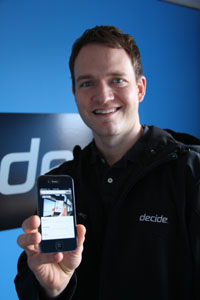There’s profit in prediction
 When undergraduate Mike Fridgen started his first business in 1997, a lot of parents suffered sleepless nights. Predictably. Imagine groups of unescorted university students heading off to Mexico on spring break tours arranged by a group of college fraternity brothers. Fridgen was the driving force behind iSTours, his first foray into the travel business and, happily, the company doubled its market volume in just one year.
When undergraduate Mike Fridgen started his first business in 1997, a lot of parents suffered sleepless nights. Predictably. Imagine groups of unescorted university students heading off to Mexico on spring break tours arranged by a group of college fraternity brothers. Fridgen was the driving force behind iSTours, his first foray into the travel business and, happily, the company doubled its market volume in just one year.
Today Fridgen is CEO of Decide.com, a unique web site and mobile app that predicts the optimal time for electronics consumers to buy their dream products. In a world of ever-changing prices and models, that information can save serious coinage. The company claims a 77% accuracy rate in its price predictions, saving buyers an average of $54.
Decide.com resulted from the discovery that similarly to airlines, electronic manufacturers use complex proprietary algorithms to regularly update the prices of cameras, computers, televisions, etc. Behind the easy-to-navigate user interface of Decide, over 100 million terabytes of computational power are constantly mining trillions of bits of data, looking for hints of price fluctuations.
The cutting edge “future-tense” predictive computer modeling that provides the backbone of Decide.com was the brainchild of Oren Etzioni, UW professor of computer science. At the time he developed Farecast, a travel program that predicted fluctuations in airfares, Etzioni became aware of how pricing algorithms were used across a wide range of industries. Fridgen was vice president of marketing at Farecast when it was sold to Microsoft in 2008 for $115 million.
Although he is in the prediction business, Mike Fridgen is the first to admit he has a rare advantage—one he could not have appreciated as a student entrepreneur. “I’m on my third venture-backed start-up with the same investors who backed iSTours and TripHub, [his second travel start-up]. I still work with Andy Farsje, one of the same company co-founders, and Decide is my second venture with Oren.”
Greg Gottesman, managing director at Madrona Venture Group and an investor since TripHub, agrees: “The teams that have repeat successes are unique. People who work with Mike have had a great experience and go on to build the next thing together.”
And back in the Web 1.0 days of the 1990s, Fridgen told a campus publication that there was “no better time to explore business options and receive guidance than in college.” Does he still believe that? Predictably, yes.
